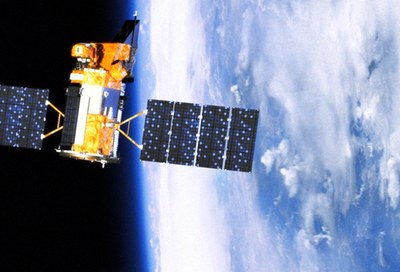Earthquakes and climate change: get the databy Lou Friedman
|
| Earth science programs and earth observing satellites were cut back drastically in the previous decade, and now, once again, they are among the chief targets of budget cutters in the Congress. |
Understanding global phenomena and planet Earth are principal benefits and goals of space programs. The earthquake got me thinking about climate change. Both will certainly happen. Both are inadequately understood. Computer models provide only approximate predictions about their timing and effects. Both earthquakes and climate change have huge effects on populations. Both require preparation and even civil defense. Both require environmental protection—in the form of safety standards for earthquakes, and in the form of pollution control for climate. And both have occurred throughout Earth’s history—which makes them no less of a concern now.
What bothers me most about the climate change “debate” is that it is so anti-science. The deniers oppose even the gathering of data about the phenomena. Earth science programs and earth observing satellites were cut back drastically in the previous decade, and now, once again, they are among the chief targets of budget cutters in the Congress. The deniers continuously and deliberately mix discussions of cause and effect. Let’s put aside the causes of climate change for a moment.
Consider the following: scientists around the world studying earthquakes make incremental improvements on understanding and even predicting them by gathering data from many sources. They create satellite maps of gravity data, set up monitoring stations around mapped areas, observe effects from past earthquakes, improve sensors, and build elaborate computer models. They begin to predict general trends, and are even starting to predict a few specific cases. The predictions are sometimes right, sometimes wrong, but always approximate. More data improves the quality of the predictions. Their work is deemed worthwhile.
Now consider the following: scientists around the world studying climate make incremental improvements on understanding and even predicting it by gathering data from many sources. They create satellite maps of atmospheric data, set up monitoring stations around mapped areas, observe effects from past climate change in plants and on landforms, improve sensors. and build elaborate computer models. They begin to predict general trends, and even start to predict a few specific cases. The predictions are sometimes right, sometimes wrong, but always approximate. More data improves the quality of the predictions. Does this seem worthwhile, like the case in the preceding paragraph? To those in Congress and elsewhere who oppose Earth science, it does not; they want to eliminate the satellites and monitoring and modeling.
Let’s take it further. In the case of earthquakes, after a consensus about the effects and models is achieved, governments implement mitigation measures such as building codes, improved bridge safety, new materials, and new architectural approaches are invented. Some of these are mandated by legislation and lives are saved. Governments also prepare earthquake response teams and disaster plans, and receive grants and even new tax or bond money to improve earthquake safety. Is this considered ideological or controversial? On the contrary, it seems to be well accepted. At the time of natural disasters (or man-made ones such as the BP gulf oil spill, Chernobyl, or terrorism), citizens demand more government action and ask why more advance preparations and safety standards weren’t in place.
Now, let’s go to the parallel case of climate change. After a consensus about the effects and models is achieved, preventive or mitigation measures such as pollution control are designed. But unlike with earthquakes or terrorism or oil spills, ideologues often say “leave it alone, climate change has been around forever; we don’t need to regulate anything.”
| I may be a space guy, motivated by exploring new worlds, but it is my view that the chief benefit of exploration is to understand ourselves, our planet, and the processes that shape our lives. |
I don’t understand why people view the science behind climate change modeling differently than they view earthquake modeling. Pollution isn’t good, and excessive greenhouse gases don’t have an upside any more than weak bridges and inadequate housing standards have an upside. Yes, taking preventive measures will cost money and impact the economy. But that can be positive. New products and new services are just as much a part of pollution control as they are of infrastructure improvements. Of course, some proposed regulations may be ill-advised or too costly (both for safety and pollution control), but the time to debate these issues is when science has provided us with the necessary data. What makes no sense is refusing to gather that scientific data.
Even if people don’t want to examine the causes of climate change, they cannot ignore its effects. Earth now supports a population of nearly seven billion people. People will pay the price of our lack of knowledge and preparation.
I may be a space guy, motivated by exploring new worlds, but it is my view that the chief benefit of exploration is to understand ourselves, our planet, and the processes that shape our lives. That we do this by exploring other worlds is a joy. But that we would choose to ignore our home planet would be tragic. All of us in the space community should argue in favor of science and against the cuts to Earth science and monitoring missions now being proposed in Congress.
